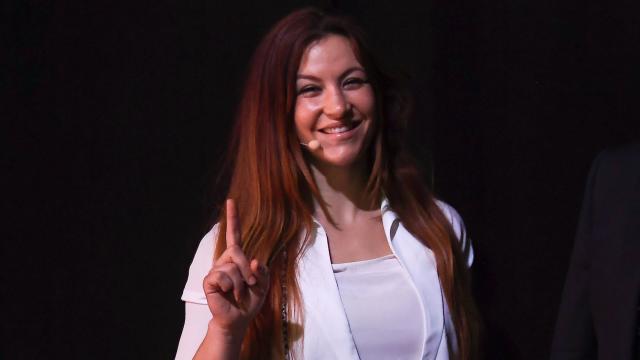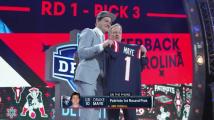Miesha Tate talks lockdown in Singapore, working for ONE and if a co-promotion could happen with UFC
Former UFC champion and current ONE Championship vice president Miesha Tate and Yahoo Sports’ Kevin Iole discuss the recent women’s strawweight title fight between Zhang Weili and Joanna Jedrzejczyk and if ONE and the UFC could ever come together and put on a joint show.
Video Transcript
KEVIN IOLE: Hey, folks, I am Kevin Iole from Yahoo Sports. And my guest is another familiar face-- one of the great women's fighters of all time, former UFC champion, now a major executive in the place of the world where there's not too much COVID-19. Miesha Tate-- how are you, Miesha.
MIESHA TATE: Yes, I'm doing good. Thank you. Yeah, thanks for giving that shout out, too, to Singapore. They really are handling the situation pretty well. And I'm grateful, but we are even locking down more so, dividing the country into quadrants, right? So you kind of-- we are in the, I would say, southwestern quadrant. So we can't really go to, like, the northeastern quadrant starting next week. So they're trying to even mitigate it more.
But Singapore is very ahead of the curve. And I think the government has handled the situation beautifully, everything considered. So we're doing the best that we can, but hope everyone is staying well around the world.
KEVIN IOLE: It is so tough. I read a piece that said-- I know the numbers were late last month. And it said there was 260 some cases in Singapore, and no deaths, which is remarkable given how close you are to China and what was going on in China. Have you been tested? They said they're testing people a lot. Have you and your family gotten tested?
MIESHA TATE: No, we haven't been tested, but we haven't had any symptoms yet, thank goodness. And we've really been trying to abide by the rules, even when they were just recommendations. But Singapore is even getting more strict. Like, you could actually be arrested if you don't give three spaces between yourself and the next person on the escalator-- so you have to, like, allow three stairs. And like-- I mean, they're very, very strict, but I appreciate that because people respect authority here. And people are taking it very seriously.
We do have a few deaths now, but again, they're-- like, the most common cases, elderly, and people with pre-existing health conditions. But you're absolutely right, you know. We have very heavy Chinese influence here. We celebrated Chinese New Year's here. I think it was at the beginning of-- or may have been end of January, right? So, I mean, our exposure was very early to the coronavirus. And I think they've been able to manage it very well.
KEVIN IOLE: What impact is that going to have on your fights, because you guys could promote fights in Singapore, and theoretically be a lot safer than anywhere else where-- I think we're looking, in the United States, we're probably not going to see too many flights until July.
MIESHA TATE: Yeah, so, every day, it's changing. And that's what makes this really difficult, because we get a plan in action. And we think it's going to work, and then, you know, the government is making rules and changes and regulations. And we understand that, too. We don't want to put anybody in danger. We don't want to endanger the athletes, we don't want to endanger the fans.
We did-- our last event was a closed venue event. It was King of the Jungle. And we didn't have any fans there. That was before that was even a requirement as well. Again, safety first. So we are aiming to try for that, but I think one of the things that people can look forward to-- it's maybe not live MMA action as of yet, although we are still working on that, is the Apprentice that's coming up with Chatri Sityodtong.
He's going to basically take 16 contestants from around the world, and offer them a deal to have a job at One Championship for one year under him-- who, I mean, the man is legendary. He's done it all. He's had an office on Wall Street. He's-- I mean, he's went through the recessions. And he's just so much more than a boss. He's a leader and a great moral human being, which I think also sometimes can be one of the tricky things to try to find in such a successful business venture.
But he's great. And we've got thousands of applicants coming in already, so if you want to try your hand and submit that, I would say, you know, go for it.
KEVIN IOLE: Well, how would somebody do it? How do they do it, if they want to do it?
MIESHA TATE: Well, basically, you just record a short video of yourself. And I think there's an email that you submit it to. But that information is all available on OneFC.com. You're able to find it there. If you just Google the apprentice, you'll be able to find the exact link. But I've just been advising people-- you know, be yourself, be passionate, be unique. And yeah, tell exactly why you think that you would make a good candidate.
Oh, and this is going to be the most intense season, or version, of The Apprentice, because it's actually going to have some physical challenges. I don't want that to scare you away. You don't have to be a professional mixed martial artist, or anything like that. But the mind and body are one, right? So I mean, I think that if you really want to be the most successful in a martial arts business world, or, I mean, in business in general-- right? I mean, you should be willing to push yourself outside of your comfort zone, regardless of what that is.
So that will be an interesting twist to this season of our version on "The Apprentice."
KEVIN IOLE: Well, there goes my shot at getting on the show. But it sounds like a great time. How did you and Chatri get together? I mean, obviously, you are now an executive. And you're very high profile. I mean, you're really doing a lot of great work. And you're out front a lot, which I love to see. I love to see a woman having a chance to run a sport that had been perceived, at one point, to be male dominated. But how did this all start, and what was the transition like for you guys?
MIESHA TATE: You know, it was back when I was still fighting for the UFC. I had come over to Singapore to do some promotions for the UFC. And while I was here, Chatri just said, hey, if you'd like to train at the gym. I mean, that's really how it started. It was just a simple invitation to train at the gym. Had dinner with Chatri-- it was like, man, this guy. Had no idea at the time who he was. I mean, this is probably back in-- oh, when was it that I first came to Singapore-- maybe 2010? I wasn't the champion yet.
So my goodness, when was it? Maybe even a little bit later than that-- 2011, 2012. Anyways, he was super, super nice to me-- opened the gyms. And the conversation we had is like a once in a lifetime. It's just somebody that you remember. You have this powerful conversation. You meet somebody, and you're, like, this is a cool person, like somebody I want to stay in touch with. And then I came back again, I think, to do some more promotion Singapore. Once again, had the dinner, had a great time, experience at the gym.
And the relationship was founded right. And then after I retired from the UFC, I had my daughter, I remember one day just sitting in my living room and thinking, you know, I'm supposed to be doing something more than what I'm doing right now. I'm not fighting anymore, but I want to I want to be more involved, you know. And I thought, you know, what if-- it just pops in my head-- what if I moved my family to Singapore and was able to get a job with Chatri?
You know, like-- and of course I ran it across Johnny's mind, too, to see, like, would you be open to that? And he's like, yeah, I would. I was like, no, I'm serious. This is not like-- I'm not joking, right?
KEVIN IOLE: Not a vacation.
MIESHA TATE: Yeah, no, I'm dead serious. I'm talking about, like, relocating for a couple of years, at least. And he's like, yeah, I would do it. I was, like, all right. So I messaged Chatri, and he said, you know what? We would be over the moon to have you. And I was so excited, and very honored at that point. And he was very gracious in his offer, and just been very good to us. So we picked up and we moved just a few months after that, about five months. And we've been in Singapore a year now, actually. This month marks a year.
KEVIN IOLE: That's crazy. And you're doing great work. Give people an example what you do on a-- at a show, and sort of to help put the shows together.
MIESHA TATE: Sure. So my role is so hard for me to define. I still don't know exactly how to define it. And it's ever changing. But what I will say that I typically do-- I like to be hands on with the athletes. OK? So I personally-- like, I get to speak to the athletes afterwards. So I help to create a of content. I like to be a voice for One Championship. So I talk to the athletes, you know, win or lose, typically. I talk to them, and just kind of see what's going through their mind frame.
And I like the fact that we interview the non-winners-- because I don't really like to think of anybody as losers, you know. But we do talk to them to get that insight. And I think a couple of years from now, when we see, like, fighters that took that bump on the road, and we see them you turning into champions or whatever, there will be a story there to tell. So I'm really excited to be laying the foundation for that right now.
I do a lot of involvement with the charity work that we do. We're heavily involved with Global Citizen, and their initiative to end severe world hunger and poverty. So I mean, so many different things. And then I also provide insight, because as an executive that's a fighter first, I still-- I feel like I'm a small fish in a big pond, because these guys are just-- they're so good at what they do, right. But I have a unique perspective, being an athlete first.
And when we're talking about dealing with athletes, we also have an agency that's under One Championship. And we work directly with the athletes. So at times, they come to me, just for the simple advice. Like, should we do this with the athletes, or should we not. And one of the big things is, like, trying to interview athletes. Like, I say two hours has got to be the cutoff. I personally like to give the athletes the whole day. But get that camera out of their face for that last couple hours.
Like, if they're vulnerable in that moment, let them be vulnerable. If they need to throw up before their match, let them throw up. That's not for the world to see, you know what I mean-- unless they are willing to volunteer that. But please don't push it on them, or ask that of them. So I'm very, very much an advocate for the athletes.
And, of course, leading the charge for women here in Asia. There's still parts of the world-- you know, we come from the Western world, Kevin.
KEVIN IOLE: Right.
MIESHA TATE: We're used to women doing and being great. And that's a wonderful change to see, especially considering when I started martial arts, it wasn't that way. But there are so many parts of the world, and especially here in Asia, that are still on that uphill battle to allow women to have the same fundamental rights as their male counterparts. So you know, I'm always working to spread the message and the initiative in those departments, too.
KEVIN IOLE: I wonder if you got a chance to see the fight at UFC 248 between Weili Zhang and Joanna. And what was your thought on that? And did that have any memory for you? I mean, my god, that was an incredible fight. I think that people are going to be talking about that one as one of the greatest fights in-- I wrote in my column that night, not just in women's MMA history, but MMA history.
MIESHA TATE: Exactly. And that's just one of those highlighting moments for females in general, that-- you know, it proves all the naysayers wrong. And I'm very proud of those ladies. I mean, they have worked so hard to be where they're at. And they delivered and they killed it. And I think it was either on International Women's Day, or the day before. So the timing just happened to be impeccable. But those women are exactly what I'm talking about. They're role models, and they are the ones that can set a shining example of just how great women can be in this sport.
I thought the fight was fantastic. I loved it. It's one of the best fights I've ever seen in my life. And they just killed it. It makes me very proud.
KEVIN IOLE: You know, when you look-- I think if you look at the Invicta fights. Invicta-- almost always, the women's fights are tremendous. And Dana has said, you know, you and Ronda Rousey, and some of the other pioneer women kind of turned him to how good the women's fights were. Why do you think it is that, routinely, women's fighters tend to have that extra drive that you see in the ring, you know, that maybe the men don't have?
MIESHA TATE: I a lot of it's the chip on the shoulder. At least for me, it was, right? And I know times have changed, where it's not the taboo thing to do. You know, it's kind of a cool thing to do, now, for females. And there's not as much resistance when you walk into a gym as a woman who wants to train martial arts. But I'll still say, you know, I still think that there is a bit of a battle.
And for myself, that's a lot of what it was-- was that I wanted to do it, and it really rubbed me the wrong way that people had a problem with me choosing my own destiny.
KEVIN IOLE: Right.
MIESHA TATE: You know, like, that's some foreign concept that women should be able to do that. It's like, yeah, we should actually be able to do that. It should be a fundamental right for everybody. But some people create a mold for what they think is appropriate for who. And a big part of my motivation was to break that mold. I did not want to be encased. I didn't want to be in a box. And I didn't want to fit a mold. I just wanted to be me.
And that's really what it boils down to. And so I think, for women, sometimes we still feel a bit of that resistance. You know, it is still out there, you know. And even in the modern Western world that we come from, there's still a lot of people that just can't wrap their minds around it, won't, or just don't support it. And you know, that's OK, to each his own. But it definitely could be something that's added motivation for women.
KEVIN IOLE: I wonder-- what was the high point for you? Was it winning the UFC title, or was it the Strikeforce championship, when you-- that was five years earlier, you won that. And that's at a point when women weren't allowed to fight in the UFC. So was that the high point, or was getting the UFC title the one of your personal fight career.
MIESHA TATE: Well, at different moments in my career they were the highlight. But if you're asking me to look back introspectively now, definitely the highlight for me was winning the UFC world title, because I think just the way that fight played out, and the finish in the fifth round-- the whole fight kind of was symbolic of my career in a nutshell.
And I really enjoyed that night. It was so memorable for me. And it was-- you know, to get on the UFC, that once didn't allow women to fight, and to head-- or, excuse me. I wasn't a headline on that event, but I have headlined UFC events before. You know-- just to be at the pinnacle of the sport, essentially, after a decade. That was almost 10 years to the day that I started fighting, that I had my first fight.
So everything, all together-- it was just such a memorable moment. But you know, I will say the Strikeforce one was a memorable moment, too, because I went into that with a grade three tear of my MCL.
KEVIN IOLE: Oh, wow.
MIESHA TATE: And a lot of people thought that-- you know, you're crazy. You shouldn't be fighting. And it was, again, one of those mind over matter situations. And I was proud of myself to be able to take out Marloes Coenen, who--
KEVIN IOLE: Very good fighter.
MIESHA TATE: Oh, my god-- like, she was incredible, especially for the time. I still remember watching her fight Cris Cyborg. And I was very young in my career. And there wasn't a lot of females to look up to at the time, and she was one of them. And I remember thinking, my god, I hope I never have to fight her-- at the time. It was so funny, you know--
KEVIN IOLE: And then there she is.
MIESHA TATE: But you know what? It's that good old adage, that you want your idols to become your rivals. And that's one-- when I still saw her so much higher than me. And I worked so hard that by the time I got to actually face her, a year or two later, I was supremely confident. And that was such a cool--
KEVIN IOLE: Development that you made once.
MIESHA TATE: Yes. It was such a cool exchange. I went from admiring her to, like, her just being on another level. And I just wasn't there yet. And then to get on that level, and actually feel like I was better. And at the end, I did. I finished her in an arm triangle choke, right. So yeah, that was a memorable moment as well.
KEVIN IOLE: I want to ask you this. I don't want to go down a rabbit hole here, but I think Gina Carano was probably the most prominent fighter that never fought in the UFC. There was a time when Ronda was the champion that Dana was trying to make that fight-- Ronda versus Gina.
How do you think Gina would have done had she-- you know, weight would have been an issue, because she had trouble making 45, let alone 35. But how do you think she would have done had she fought against the group of UFC women who were there when you were the champion, and even a little before that?
MIESHA TATE: You know, I think that Gina would have done well. I don't necessarily say that she would have won them all, but I mean, she's passionate. She was strong. She had a lot of determination. And I think, also, when I talk about a chip on the shoulder, that's something that you can't just break down as a part of a skill set.
KEVIN IOLE: Right.
MIESHA TATE: I mean, Gina was one of the ones who had to take the brunt of that heavy criticism, and that-- you don't belong here, or you're too pretty. Or, I mean, all the negativity, right? Like, she's one of the ones that had to break the initial glass ceiling. And it was not an easy time when Gina was doing that-- you know, was making those.
So what I'm saying is, I think that her mental fortitude is something that you can't really calculate in a skill set. And I think that she would have done well.
KEVIN IOLE: Yeah, I always thought so too, Miesha, because I felt like when she fought Cyborg, even though it was a first round finish, she was in that round. Like, some people look back on it, and it was what, over 10 years ago now? And now, some people think, oh, she got blown up. But you watch that fight, and Gina had her moments in that first round. And Cyborg caught her toward the end of the round, but it was certainly-- you could see that fight, on a certain trajectory, that Gina might have won the fight had she not got caught with the one shot.
MIESHA TATE: Yeah, I mean, she-- that's what I mean. And Cyborg was demolishing everybody at that time, and the fact Gina could actually hit her and do some damage, I mean, it just-- it said something, right? I mean, it was something that really, no one else was able to do. So Gina is a talented woman, and I'm so happy for her and her career now-- you know, what she's doing with Disney and all that good stuff. Like, she's just an incredible individual. If you don't follow her, you should. She's a fun person to follow on Instagram and whatnot.
KEVIN IOLE: Yeah, she sure-- you know how old I am. I remember her dad playing in the NFL, so that shows how old I am. Just to wrap up, I saw Chatri said recently, I think it maybe was this week, that he was interested in co-promoting with UFC on a women's title fight. So that's been the age old question-- how do you get Dana White to do that? He's never wanted to do that.
So my question for you is, do you think that that is necessary. Is there even a need? Like, I've always kind of said, hey, stay in your lane, and make your product the best it is. Don't worry about having your fighters fight UFC. What does that prove? Well, what do you think? Do you think it's good for the sport? Do you think it should happen? And do you feel like there's ever a day when it might happen, when the UFC might open the doors? You know what goes on in the UFC. Do you think that may ever occur?
MIESHA TATE: You know, it's interesting. In the recent light of this COVID-19 virus and whatnot, I feel like if the idea was ever going to be at the forefront of someone's mind, like Dana's, I think it would be at a time like this. You know-- because how can we deliver live sport? You know, no sport is able to do that right now. And I think that, of all the sports, probably martial arts is the closest. And maybe if you have two top dogs working together, something could happen for the greater good.
Do I think it should happen? You know, I'm all for like-- like Chatri always says, a rising tide makes all the ships sail higher, right? So it's not-- we don't need to be enemies in this, right? I mean, we have our different strategies. And we're going to have our different fan bases. And that's OK. But I think it would be kind of cool. It's been done in the past, right? I mean, we've seen other top organizations putting on super fights and things like that.
I mean-- and what, we always talk about comparing Bellator and, you know, the top-- we would have talked about Ben Askren and how would he do. That was a great-- not controversial, I wouldn't say. But you know what I'm saying. It was highly interesting.
KEVIN IOLE: Right.
MIESHA TATE: Right. He came from one championship, then people wanted to see how he's going to do in the UFC. So anyways, what I'm saying is, I think that there is some leverage that could be done. And I think that the fans would appreciate that, overall. So if we were going to do it for anybody's sakes, I mean, why not? Why not do it for the fans? We don't have to be enemies of this, you know?
KEVIN IOLE: I think if it makes the fighters more money, and it's good for the fighters, I'd be into it. But color me a skeptic. I don't know that we're going to see that, so--
MIESHA TATE: I mean, you never know. I mean, we've seen crazier things happen, I feel like. You know, there was a time when Dana was saying that we'll never see women in the UFC. So I mean, you never know. It would be cool, I think. I mean, I wouldn't say it would be a regular thing. But to see, potentially, down the road, you know, two successful world champions-- you know, we have Xiong Jing Nan is our Chinese world champion. And she is a monster.
KEVIN IOLE: A knock-out artist.
MIESHA TATE: Yes, she is. I would love to see her fight Weili. I mean, that would be really cool, wouldn't it? I mean, two of the best, from China, going at it, from two different organizations. It would be pretty cool.
KEVIN IOLE: I think they might get pretty good TV ratings there.
MIESHA TATE: I agree.
KEVIN IOLE: That'll do something. Miesha, one of the best to ever do it, and a brilliant MMA mind. Thank you so much for taking the time.
MIESHA TATE: Absolutely. Thanks, Kevin.
KEVIN IOLE: Appreciate it, Miesha.








